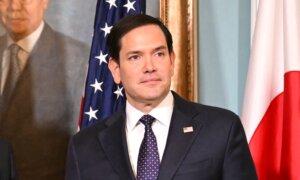Senators question experts during a hearing on national security and trade implications surrounding the Panama Canal.
An international law expert testifying before the U.S. Senate on national security threats to the Panama Canal said that “foreign operation” of the canal is prohibited and that China’s de facto control of ports on both ends of the canal potentially violates its Neutrality Treaty.
Eugene Kontorovich, a professor at George Mason University’s Antonin Scalia Law School and senior research fellow at the Heritage Foundation’s Margaret Thatcher Center for Freedom, testified before the Senate Committee on Commerce, Science, and Transportation on Jan. 28 concerning the canal’s effect on U.S. trade and national security.
Most of the discussion surrounded the canal’s national security implications. President Donald Trump vowed to take back the canal because of concerns about China’s influence on its operation.
The canal has both economic and military significance because it represents a strategic chokepoint. It is a critical pathway for U.S. warships in the Atlantic and Pacific oceans, which could play a crucial role in a conflict with the Chinese regime.
Kontorovich said that Panama has allowed Chinese companies to operate ports on both ends of the canal, potentially violating the treaty with the United States.
However, he said, that would depend on the degree of Chinese control and involvement in the Chinese companies operating the ports.
Authorities in Panama announced on Jan. 20 that they have launched an audit of the Hong Kong-based port operator.
Kontorovich noted that Hong Kong businesses were originally under British authority before Hong Kong was handed over to China, which is ruled by the Chinese Communist Party (CCP).
“One need not wait until the canal is actually closed by some act of sabotage or aggression, which, as we heard from the testimony, would be devastating to the United States,” he said.
The CCP mandates that Chinese companies cooperate with state intelligence agencies.
The deal consists of two treaties: the Treaty Concerning the Permanent Neutrality and Operation of the Panama Canal, also known as the Neutrality Treaty, and the Panama Canal Treaty.
Both Republicans and Democrats expressed concern about Chinese influence at the canal.
“The United States paid for and built the Panama Canal, but Panama is treating America unfairly and ceding control of key infrastructure to China,” committee Chairman Sen. Ted Cruz (R-Texas) said.
Minority ranking member Sen. Maria Cantwell (D-Wash.) expressed concern about security risks to infrastructure that could affect supply and prices.
She also questioned whether the current audit of Hutchison concessions would allow U.S. companies to get involved.
“My major point is, let’s be a big maritime powerhouse. Let’s revitalize our supply chains, drive down costs for consumers, and secure what we need to secure,” Cantwell said.
Daniel Maffei, commissioner of the Federal Maritime Commission, told the senators that the United States doesn’t have jurisdiction over individual ports. However, U.S. businesses are at a disadvantage in winning projects because China subsidizes bids, making it impossible for U.S. businesses to compete.
Dan Sullivan (R-Alaska) questioned the “sweetheart” no-bid deal given to Hutchison, saying China was known for “bribing” officials worldwide.
Louis Sola, chairman of the Federal Maritime Commission, noted that the Panama Canal Authority controls the operation of the canal as a separate entity from the Panamanian government.
However, Sola said the Hutchison ports are given a special permit to operate because directing ships into or out of their ports blocks the canal’s traffic.
In addition to the canal, the United States turned over the land, military bases, and waterway along the entryway to Panama, he said.
Original News Source Link – Epoch Times
Running For Office? Conservative Campaign Consulting – Election Day Strategies!


